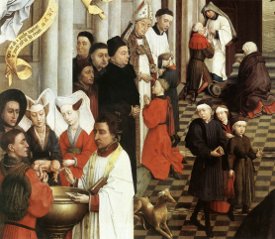"Williams, the spiritual leader of Anglicans worldwide, will visit the Vatican on Nov. 17 in honor of the 50th anniversary of the Pontifical Council for the Promotion of Christian Unity"
Body
Discussion
Synod of Catholic Bishops: Israel Can't Use Bible to Justify Claim to Land
Body
Discussion
"Conventional wisdom holds that the papacy is increasingly a millstone around Roman Catholicism’s neck"
Body
Discussion
Confused about Catholicism, Part 3
 (This series on evangelical confusion about Roman Catholicism originally appeared as one article in JMT, Fall, 2008. Read Part 1 and Part 2).
(This series on evangelical confusion about Roman Catholicism originally appeared as one article in JMT, Fall, 2008. Read Part 1 and Part 2).
Areas of disagreement between Roman Catholics and evangelicals
(2) A different view of ultimate authority
Related somewhat to one’s understanding of church history is one’s viewpoint of ultimate authority as quotations above suggest. From the Catholic side there is the general sentiment that since Christ formed the church (a single church) it inherently carries His authority. Perhaps the general Catholic thought is summed up with these words: “They [Protestants] are not clear-headed enough to perceive that a proper notion of the Church is a necessary stage before we argue from the authority of Christ to any other theological doctrine whatever.”1 Adding some intensity, the same writer goes on to claim that “the Protestant had no conceivable right to base any arguments on the inspiration of the Bible, for the inspiration of the Bible was a doctrine which had been believed, before the Reformation, on the mere authority of the Church; it rested on exactly the same basis as the doctrine of Transubstantiation.”2 Karl Rahner, the famous Catholic theologian, says the same truth in a different way. He speaks of the two aspects of the faith of a Christian. Those two aspects are faith in Christ and faith in the church, not faith in God’s Word:
It makes no difference…whether he believes in the Church first and then in the rest of matters proposed for his belief because these come from the Church, or whether he first attains to belief in Christ and his word, and goes on from there to belief in the Church as founded by Christ…On the basis of faith in Christ the believer includes the Church too in his faith in such a way that it immediately becomes the direct medium and rule of faith as such.3
Discussion
Confused about Catholicism, Part 2
 (This series on evangelical confusion about Roman Catholicism originally appeared as one article in JMT, Fall, 2008. Read Part 1).
(This series on evangelical confusion about Roman Catholicism originally appeared as one article in JMT, Fall, 2008. Read Part 1).
Areas of agreement
Another area in which honesty is needed and which is sometimes a stumbling block for evangelistic outreach to Roman Catholics is the fact that Catholics and evangelicals really do agree on quite a few theological points. So here a review of some of the most important agreements will be given before the areas of disagreement are brought forward.1
First, Roman Catholics and evangelicals agree on the nature of God. At the most basic level, both view God in the sense of classical theism. What is meant by classical theism is that there is one Creator God2 who is personal, transcendent, and immanent. Note the following declaration from the Vatican I council (1869-70) which is still official church dogma:
The holy, Catholic, apostolic Roman Church believes and professes that there is one true and living God, the Creator and Lord of heaven and earth. He is almighty, eternal, beyond measure, incomprehensible, and infinite in intellect, will and in every perfection. Since he is one unique spiritual substance, entirely simple and unchangeable, he must be declared really and essentially distinct from the world, perfectly happy in himself and by his very nature, and inexpressibly exalted over all things that exist or can be conceived other than himself.3
 (This series on evangelical confusion about Roman Catholicism originally appeared as one article in
(This series on evangelical confusion about Roman Catholicism originally appeared as one article in 
Discussion